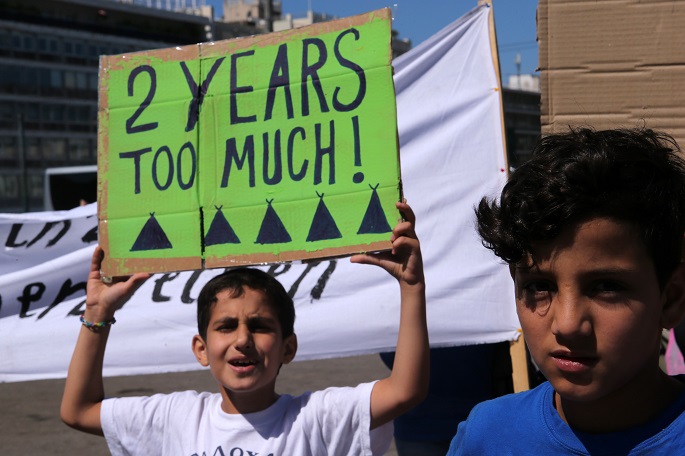Refugees protest in Athens over slow family reunifications
Published : 02 Aug 2017, 20:43
Updated : 03 Aug 2017, 03:17
Hundreds of refugees living in reception camps, hotels and rented apartments across Greece staged a symbolic peaceful demonstration here on Wednesday against the slow pace of relocations to Germany for family reunifications.
Refugees marched from Syntagma square to the German embassy and the EU's offices in the Greek capital, requesting a swift change. Several were holding banners and placards reading "Our children wait for us," "No separation EU" and "The right to reunite is not a crime."
Most of the protesters were Syrians stranded in Greece after the closure of the Balkan route to central Europe in March 2016. More than 62,000 refugees and migrants have been trapped in Greece.
Despite progress made regarding living conditions in camps, the assessment of asylum bids and relocation process to other European countries still take several months.
By July 24, 2017, according to the European Commission, a total of 16,803 persons had been relocated from Greece and 7,873 from other EU countries under the 2015 deal between member states who committed to accept at least 40,000 people from Greece and Italy within two years.
The suffering is worse for parents and children who were separated during the perilous journey from war-torn Syria to safety in Europe.
Approximately 2,500 applications have been lodged, accepted and still pending this year for family reunifications from Greece to Germany, according to Greek Asylum Agency data.
By April this year almost 900 refugees travelled from Greece to Germany to reunite with their relatives, but from April the number of people reaching Germany had dropped to about 70 on average per month under an informal bilateral agreement.
On July 18, responding in written on behalf of the European Commission to a question submitted by a Greek member of the European parliament regarding this informal arrangement, European Commissioner for Migration Dimitris Avramopoulos noted that "Germany may prolong the normal six months transfer time period for those persons" under the Dublin Regulation.
"However, in case the delays would be unduly long and might as a result affect the human rights of the applicants, such arrangements could raise an issue of their compatibility with European Community law and international human rights instruments," the commissioner added.
Refugees in Athens on Wednesday protested the delays were already too long.
"The procedure is going really slowly. We are waiting for a long long time. They are taking just 70 persons each month. This is not legal," Mohammad T., said.
Protesters dispersed after two of the representatives held a meeting with German embassy diplomats who said that they will forward their request to Berlin.


